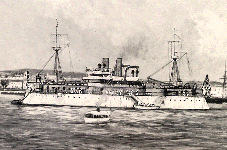
The USS Maine
Millegan Stews

The USS Maine
"The war was prepared in advance."
Kris Millegan
9/16/011
The Gilded Age
Twas a time when the rich got richer and richer, there was no income tax, no corporate tax. Fortunes were being stacked high. Congress was the playground of millionaires and Queen Vicky was still enthroned.
The “Gay Ninties” was quite the age.
JP Morgan “saved" the country from bankruptcy in 1895 and then there was the “Cuban Question.”
Americans had their sights on annexing Cuba officially since Jefferson's presidency. By the 1890's Cubans had been insurgent for many years against Spain. "Perhaps the strongest center of pro-Cuban activity [in the US] was the commercial interests of the Mid-West," St.Louis, Chicago and Cleveland. Most Amercans of the times were supporting a peaceful resolution, and were soon to be taken for a ride that some observers say led to the confrontation at Pearl Harbor, almost 50 years later.
In 1888 Congress had appropriated money for a clerk to collect and organize the various reports gathered from officers in the field. This led to the establishment in the War Department of the “confidentially” Military Information Division (MID) this office wasn’t the first operational office of "peacetime espionage," the Office of Naval Intelligence (ONI) had been established officially in 1882.
At first MID directed most of its efforts towards Canada, but soon was spending most of its time on Cuba. By 1896 MID was occupying three main-floor rooms at State, War and Navy employing many officers and a “corps of civilian clerks” gathering materials, producing maps, charts and analysis.
The press was having a field day with Pulitzer and the Comstock's Ophir mine magnate, Hearst, upping each other’s jingoistic jabber to the point of fabricated stories.
A solution to the troubles was almost concluded and then . . . the USS Maine blew up in the Havana harbor. A commission was called and blamed it on a Spanish mine. The “yellow press” went overtime and Henry Cabot Lodge and Theodore Roosevelt ratcheted up pressure on President McKinley, finally convincing him that the future of the Republican Party “depended on war with Spain.”
After the war, Teddy Roosevelt as President gave “tacit encouragement to revolt in Panama," beginning an interventionist doctrine which lasts until today . . .
Admiral Rickover, later became interested int the USS Maine blast and conducted an investigation that concluded it was a coal bin explosion. More recently there has been a National Geographic 1998 investigation using the latest technology and it made no firm conclusions saying it was either a mine or a coal bin explosion.
A recent report from the Seattle Times ( Sunday, February 8, 1998 ) states:
“A Cuban naval historian, Gustavo Placer Cervera, more in touch with technical analyses of what happened that night, subscribes to the "Rickover report" - the conclusion that the Maine explosion was probably an accident, not sabotage.
But what's more important, says the retired navy commander, is that the U.S. government "manipulated and used the explosion . . . The key fact is that the war was prepared in advance."
Om
K